By Uzair Adam, SolaceBase
The Bompai Industrial Area in Kano State hosts a range of companies, including foreign-owned firms. It is also home to numerous unregistered recycling businesses, where many youths toil for meager earnings.
The hazardous plastic manufacturing and crushing machines in these facilities have left countless young workers disabled, with some losing fingers or limbs, and others tragically losing their lives.
SolaceBase has discovered that, in most cases, victims or their families receive little or no compensation. Even in instances of death, families are left to grapple with the sorrowful loss of a relative or the severe disabilities suffered by their loved ones—a situation that conflicts with the provisions of the Employee Compensation Act of 2010.
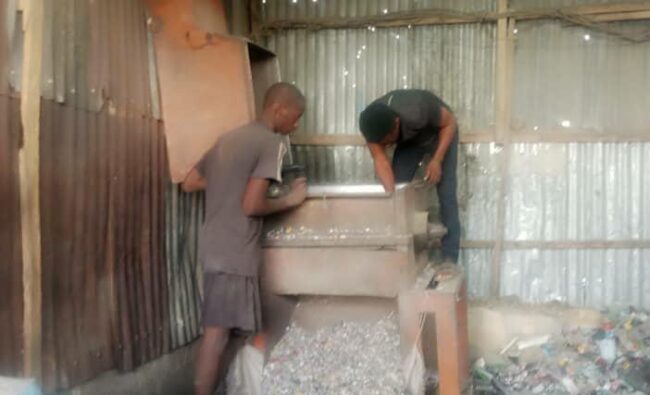
This newspaper uncovers the grim realities faced by these workers—overworked, underpaid, and often abandoned by employers after life-altering accidents—leaving them with shattered futures and no hope for justice.
Isah Prince, a 24-year-old victim, tragically lost his life while toiling to earn a monthly salary of just N35,000 at an unregistered company, Alhaji Umar’s factory. On his very first day at the factory, an unexpected accident with a crushing machine severed his arm.
In his final moments, Isah lay on the ground, crying out for help as blood gushed out from his wound. Some courageous workers rushed him to Sir Muhammad Sunusi Hospital, where his family was summoned to witness the heartbreaking situation that had befallen their brother.
Upon their arrival, Alhaji Umar was called to the hospital to see what had happened to one of his employees and to settle the medical bills before doctors could attend to Isah. However, Alhaji Umar said to had traveled and asked them to do everything needed when he comes back, he would pay them.
In a trembling voice, Isah’s brother, Abubakar Alhaji Ja’afar, recounted the betrayal they experienced when Alhaji Umar came back as he claimed to have no money to pay for Isah’s treatment, citing financial problems. He urged Isah’s relatives to cover the costs, promising to reimburse them once his financial situation improved.
“This man visited us only twice in the hospital and again after the news of Isah’s demise spread. He refused to pay for Isah’s treatment, despite the receipts we presented, and he did not offer us a single kobo as compensation,” he lamented.
Ja’afar detailed the family’s struggles, “We spent a lot of money, as one injection cost N7,000 and we had to buy two daily for Isah to have any chance of recovery. After a family meeting, we decided to take him to court. However, we were advised against it, as pursuing legal action would only waste more money, considering his influential status and the fact that his elder brother is a judge with strong connections in Kano’s courts. That is how the blood of our brother went for nothing.”
The pain of Isah’s tragic death still lingers in the hearts of his family, much like the grief experienced by the Danhakki family when they were struck by a similar tragedy at Bally Plastics and Footwear Ind. Ltd some years ago.
Danhakki`s father, Malam Miko Wanzam, speaking in a sorrowful voice, narrated to SolaceBase how the memory of his son’s death remains fresh, particularly the sense of injustice surrounding it, recounting the unsuccessful legal battle that followed.
“One day, I received the devastating news that my son was killed instantly when a mole fell on his head while he was lifting it. At first, I couldn’t believe it until I saw him with my own eyes, lying motionless in a pool of blood,” Wanzam recalled.
He continued, “We demanded compensation, and the company offered us only N600,000. We protested against the meagre amount and tried to take legal action. However, we couldn’t afford the legal fees and resorted to reporting the case to traditional rulers, including the Nasarawa District Head, but to no avail.”
Wanzam added that, despite their efforts, the family was left grappling with a deep sense of injustice. In the end, they had no choice but to accept the money, as they were unable to seek justice for their son’s death.
Overstretched Work That Leaves Young Men Disabled
SolaceBase has also uncovered how many factory owners overwork their employees, forcing them to do two or even three shifts instead of a single 12-hour shift. This extreme exhaustion often leads workers to mistakenly place their hands in crushing machines, resulting in severe injuries and permanent disabilities.
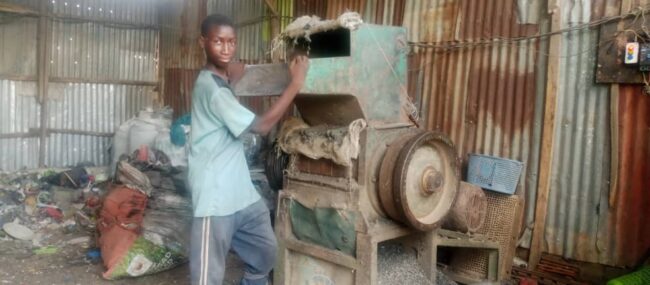
Lawan Isma’il, a 26-year-old victim, recounted how his future dimmed after his hand was severed in a crushing machine at another unregistered company, Alhaji Harisu’s factory in the Bompai industrial area, where he earned a monthly salary of N45,000.
He described the area as a deadly zone, where the future of youths are threatened due to the hazardous working conditions. “I know over ten people from different factories who have been left disabled,” he lamented.
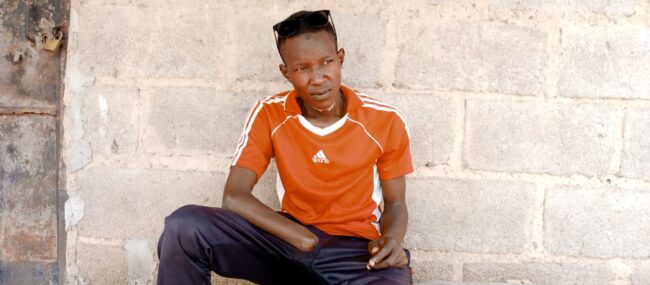
Isma’il was forced to work three consecutive shifts totaling 36 hours—7:00 AM to 7:00 PM, 7:00 PM to 7:00 AM, and another 7:00 AM to 7:00 PM. Exhausted, he mistakenly placed his hand in the crushing machine during the last shift and lost it.
“When I completed the first two shifts, I went home, but my employer called me early the next morning, insisting I come in for the third shift because the morning worker was absent. I refused, but he insisted, so I returned to the factory, unaware of the tragedy that awaited me,” he recounted.
“I was rushed to Arewa Hospital along Ring Road, where I spent a week, and he paid for my treatment. Just a year before my accident, a colleague had lost his hand and sustained burns to his stomach in a similar incident,” he added.
Despite his injuries, Isma’il’s employer allegedly refused to offer him compensation and eventually dismissed him due to his inability to work as before. “Whenever I visited the factory, he would give me a thousand or two, and that was it,” he said.
“When my family insisted that he should retain me, even as a sweeper or cleaner, he offered me a N500,000 incentive to start a business instead, still refusing to give any further compensation,” he added worriedly.
Basiru Danjuma, a worker at an unregistered company, Alhaji Ibrahim Aliyu’s factory, also suffered a life-changing tragedy when he lost his hand after being asked to work two consecutive shifts. His mother, Fatima Goni, tearfully pleaded with the factory owner to compensate her son for the injury, but her pleas were allegedly met with cold indifference.
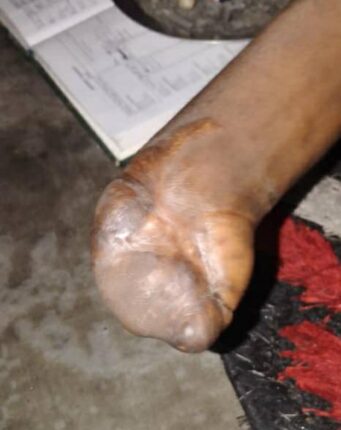
She recounted the event that occurred shortly after the 2023 general elections, which left her son disabled. “Basiru went for the night shift but didn’t return the next morning. I later learned he had stayed for the morning shift because those workers were absent,” she said.
At around noon, Basiru, a 23-year-old young man with dreams of supporting his family, suffered a horrific accident that severed his hand, destroying his future.
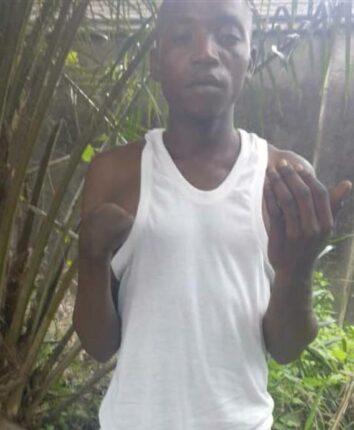
Goni explained that her son was taken to Sir Muhammad Sunusi Hospital, and while the factory owner paid for the treatment, he refused to offer further compensation. “A month or two after the incident, we asked for compensation, but he refused. I remember kneeling before him, begging in tears, but he still refused.”
She said they sought help from the police and journalists, but nothing worked. “The man told us he had done everything he could and, if we were dissatisfied, we should take him to court. He boasted that he is a Lawyer and knew all about the legal process.”
In a sorrowful voice, she added, “The only money I know he gave us was N3,000 when he visited us in the hospital. Now, he no longer answers our calls.”
Ongoing Struggles
Ibrahim Sulaiman, 25, recounted the traumatic experience of losing a finger at HWA Chong Household Utilities Limited. Despite the situation, he continues to work there because he cannot find employment elsewhere, with fear of losing another part of his body.
He explained, “The incident happened on a fateful Sunday when the engine caught my hand and severed my finger. I was taken to the hospital at 8:00 AM but wasn’t treated until 10:00 PM. The actual surgery took place the following day, and I bled excessively during that time.”
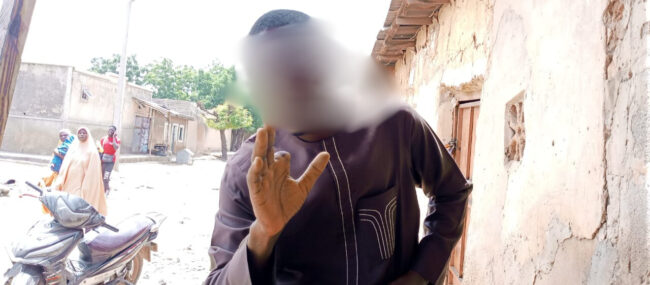
Sulaiman noted the alarming number of people who have lost fingers or arms at his company, claiming to know over fifteen other victims since his accident.
“It pains me every time I look at my hand. My mother also struggles to cope and cry when she sees it. The entire situation is agonizing,” he expressed.
Although the company paid for his treatment and provided N100,000, Sulaiman felt the compensation was inadequate and quickly depleted as he continued to struggle with his health.
“It still hurts when I touch the part. Sometimes, especially when it rains, it itches and causes me pain. Even the money that was given to me would not be enough for this continued struggle,” he said.
Legal Battle Ends In Defeat For Injured Worker
Another victim from Bally Plastics and Footwear Ind. Ltd, who requested anonymity due to his ongoing employment with the company, recounted the harrowing experience of losing his arm in a workplace accident when a machine malfunctioned. Despite seeking compensation through legal means, his efforts were ultimately unsuccessful.
Having worked for over 20 years with the company, he described the situation as devastating, noting that a close friend had also died in a similar incident. “I know another person who lost both hands,” he added grimly.
He said that he sought compensation of six million naira through a lawyer, but the company’s alleged significant influence and powerful connections thwarted his efforts.
“In the end, they only gave me 100,000 Naira,” he said. “I had no choice but to accept it because even if I refused, the company wouldn’t offer anymore.”
He further lamented, “The company operates like a government—it’s untouchable. We tried everything to fight for our rights, but nothing worked. Many of us have quit our jobs and now struggle to put food on the table. We simply couldn’t sustain the legal battle.”
Workers’ Rights And Company Responsibilities
Legal practitioner Barrister Ahmad Rufa’i emphasized that many workers are unaware of their rights regarding workplace injuries and fatalities. He noted that companies are legally required to compensate employees who are injured or killed while on the job. This includes covering medical treatment costs and providing daily allowances.
According to the Employee Compensation Act of 2010, if a worker dies and leaves behind a spouse and children, the family is entitled to receive 90% of the deceased’s salary until the children reach maturity. This compensation is separate from any additional benefits for the loss of their father.
He explained that if the deceased had only one child, the family would receive 85% of the salary, while a wife without children would receive 60%. For workers with total permanent disabilities, compensation is 90% of their salary for life. Similarly, those with permanent facial disabilities are also entitled to 90% of their salary.
Barrister Rufa’i warned that companies often attempt to avoid compensation by offering victims’ families small sums of money. He urged individuals to resist these offers and pursue legal action to ensure proper compensation.
In cases of workplace injuries, whether on or off company premises, workers should be compensated based on the severity of their injuries. “It’s crucial for the injured worker or their relatives to report the injury within 14 days. Companies then have seven days to compile the necessary information and submit it to the Nigerian Social Insurance Trust Fund, which facilitates the compensation process,” he stated.
But reacting to questions posed by SolaceBase on the matter, the Personnel Manager of Hwa Chong Household Utilities Limited, Shu’aibu Iliyasu, insisted that the company compensates workers who are injured, disabled, or even die as a result of workplace accidents.
Speaking on behalf of the Chinese manager, who declined to comment, Iliyasu contradicted the workers’ complaints.
He claimed, “This company is different from many others in this industrial area, especially regarding salary and welfare. In addition to compensation, we have implemented safety measures to protect our workers from potential dangers posed by the machines.”
However, SolaceBase made efforts to speak with the manager of Bally Plastic & Footwear Ind. Nigeria Ltd., but the attempts were unsuccessful.
The contact number listed on the company’s official LinkedIn page was not reachable. When our reporter visited the company, the manager on-site reportedly only understood Chinese.
When the reporter asked for an alternative contact, the individual said that no one else could speak on the manager’s behalf. “There is another person called Mr. Zhang,” he added, “but he is currently out of town, traveled to Lagos, and we don’t know when he will return.”
Commenting on the development, Kano State NLC Chairman, Kabir Inuwa, condemned certain companies for committing what he described as sheer injustice, accusing them of deliberately avoiding the NLC in order to continue exploiting their workers.
Inuwa emphasized that the NLC plans to involve the Kano State Government in the battle against these companies. “It has come to our attention that some workers are not being properly compensated. However, the NLC cannot immediately step in on such matters.
“We have specific rules, regulations, and procedures. Workers must first form a union, and if they experience any injustice, the union should report the issue to us, and we will do our best to fight for their rights,” he explained.
He recalled a committee that was once headed by the late Comrade Wada Waziri to tackle such problems. However, he pointed out that these companies often intimidate workers to prevent them from forming unions, making it difficult for the NLC to intervene effectively.
This report was published with the support of Civic Media Lab
Since You Are Here, Support Good JournalismCrossRiverWatch was founded on the ideals of deploying tech tools to report in an ethical manner, news, views and analysis with a narrative that ensures transparency in governance, a good society and an accountable democracy. Everyone appreciates good journalism but it costs a lot of money. Nonetheless, it cannot be sacrificed on the altar of news commercialization. Consider making a modest contribution to support CrossRiverWatch's journalism of credibility and integrity in order to ensure that all have continuous free access to our noble endeavor. CLICK HERE |
New Feature: Don't miss any of our news again.Get all our articles in your facebook chat box.Click the Facebook Messenger Icon below to subscribe now
Text Advert by CRWatch :Place Yours

Will You To Learn How To Make Millions Of Naira Making Special Creams From Your Kitchen?.Click Here
Expose Your Business And Make More Sales. Advertise On CrossRiverWatch.com Today

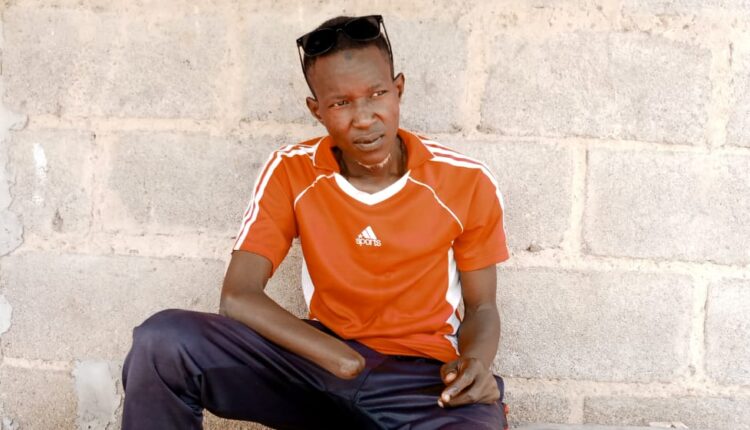

Leave feedback about this